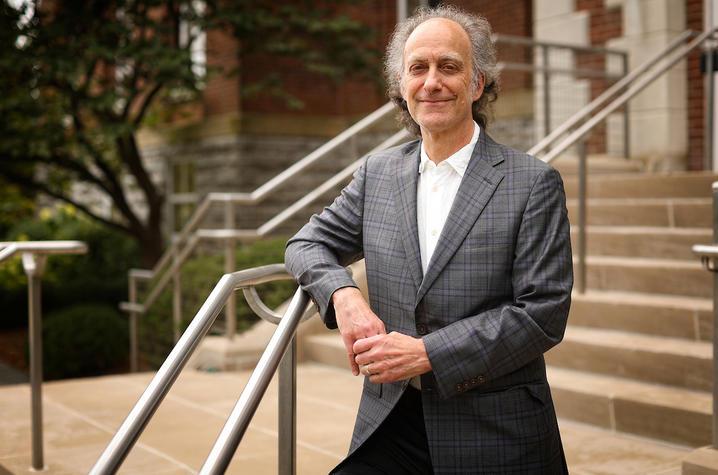
LEXINGTON, Ky. (Sept. 22, 2023) — Theodore Schatzki, professor of geography, philosophy and sociology at the University of Kentucky, is serving as the 2023-24 College of Arts and Sciences’ Distinguished Professor and will deliver the annual Distinguished Professor Lecture next spring.
This honor is bestowed on the basis of three criteria: outstanding research, unusually effective teaching and distinguished professional service.
“Naturally, it’s great to be honored in this way. It's especially gratifying to be recognized by one’s colleagues, and for work that falls between, and not in, any particular discipline,” Schatzki said. “Thanks goes to everyone who played a role in my reception of this award.”
Throughout his time at UK, Schatzki has established himself as a renowned educator, mentor and researcher.
He earned a degree in applied mathematics from Harvard University (1977) and degrees in philosophy from Oxford University (1979) and University of California, Berkeley (1982, 1986).
Schatzki’s research interests lie in theorizing social life. He is widely associated with, and co-organizes a thriving international network on, a theoretical approach called “practice theory,” which is active today in many social disciplines. Schatzki’s current research centers on the digitalization of society, which is the spread of digital devices, infrastructures and services through social life.
“I’m especially interested in using the resources of social theory — in particular, theories of social practices — to conceptualize and analyze the effects of digitalization,” Schatzki explained. “Digitally-wrought changes in contemporary life are incredibly important. They are also so numerous that it is difficult to track significant changes and the problems they create. My hope is, that scholarly work puts society in a better position to grasp and confront these issues.”
Among his many publications are five monographs: “Social Practices” (1996), “The Site of the Social” (2002), “Martin Heidegger: Theorist of Space” (2007), “The Timespace of Human Activity” (2010) and “Social Change in a Material World” (2019).
Schatzki’s work has been recognized nationally and internationally. According to the Scopus index list from a 2021 Stanford study, he was the 13th most cited philosopher in the world in 2020.
Schatzki has been a research fellow of the Fulbright Commission and the Humboldt Foundation and a visiting professor or researcher at numerous institutions including the University of Exeter, the Max Planck Institute for the History of Science (Berlin), the Institute of Advanced Studies (Vienna), Lancaster University (United Kingdom), University of Zürich, University of Bielefeld (Germany), Free University (Berlin) and University of Bergen.
Additionally, in 2018, he received an honorary doctorate from Aalborg University in Denmark.
Schatzki, who is also dedicated to serving students, teaches undergraduate courses on a variety of topics and was named one of 14 University Research Professors for 2022-23.
“The exceptional multidisciplinary nature of my research carries over into my classes — both those taught under department prefixes and those taught as part of transdisciplinary programs,” Schatzki said. “This teaches students how academic knowledge, which is generated in multiple sorts of traditions and institutional arrangements, forms a larger, connected structure. Experiencing these, students are a little better prepared for encounters with the messy, contingent composition of and connections among phenomena in the world.”
In addition to his role as a professor, Schatzki has also served as former senior associate dean in the College of Arts and Sciences, former chair of the Department of Philosophy, and co-founder and former co-director of UK’s Committee on Social Theory.
“Professor Theodore ‘Ted’ Schatzki's dedication to teaching, research and professional service has left a profound mark on his field, the College of Arts and Sciences and the University of Kentucky,” Dean Ana Franco-Watkins said. “His pioneering work in interdisciplinary areas, including practice theory and digitalization, showcases his commitment to expanding the horizons of knowledge. We look forward to the valuable insights he will offer to our academic community during his Distinguished Professor Lecture.”
The Distinguished Professor Lecture will take place Spring 2024, and more details will be released at a later date.
As the state’s flagship, land-grant institution, the University of Kentucky exists to advance the Commonwealth. We do that by preparing the next generation of leaders — placing students at the heart of everything we do — and transforming the lives of Kentuckians through education, research and creative work, service and health care. We pride ourselves on being a catalyst for breakthroughs and a force for healing, a place where ingenuity unfolds. It's all made possible by our people — visionaries, disruptors and pioneers — who make up 200 academic programs, a $476.5 million research and development enterprise and a world-class medical center, all on one campus.
In 2022, UK was ranked by Forbes as one of the “Best Employers for New Grads” and named a “Diversity Champion” by INSIGHT into Diversity, a testament to our commitment to advance Kentucky and create a community of belonging for everyone. While our mission looks different in many ways than it did in 1865, the vision of service to our Commonwealth and the world remains the same. We are the University for Kentucky.
